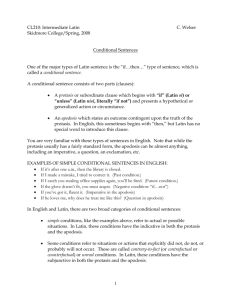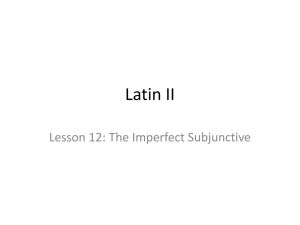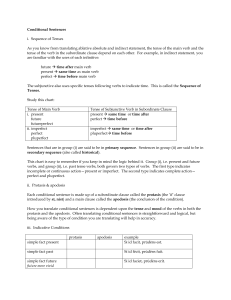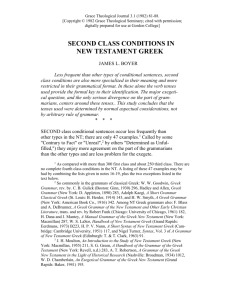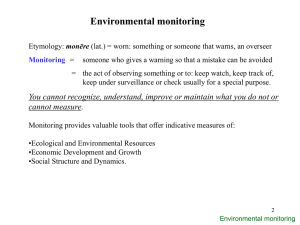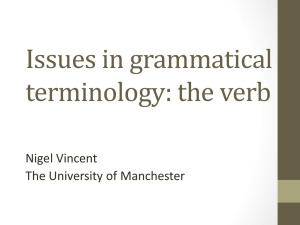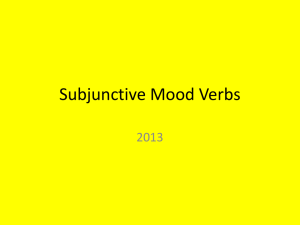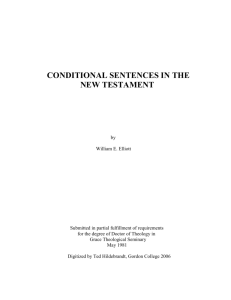ppt - Latin 601
advertisement
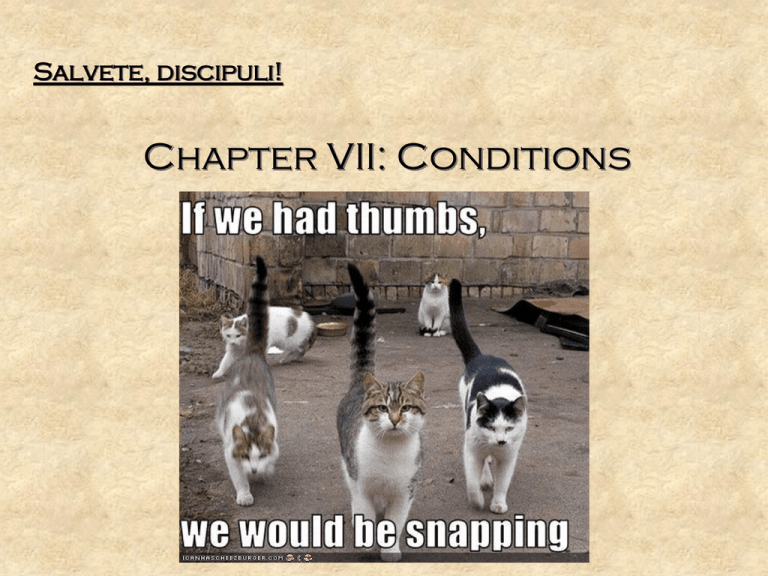
Salvete, discipuli! Chapter VII: Conditions Review Sessions Tuesday, 10/12 @ 5:30-7 in WAG 208 Thursday, 10/15 @ 1-2:30 in CAL 221 Conditions: the Basics A condition is, at its most basic, a compound sentence consisting of two parts: 1. A “if” clause 2. A main clause In grammatical terms, the “if” clause is called the protasis and the main clause is called the apodosis. Conditions: the Basics If you give a mouse a cookie, apodosis apodosis protasis protasis he’s going to want a glass of milk. Types of Conditions Conditions, like all other verbs, can only occur at three times: present, past, and future. All the tenses have one ‘simple’ condition and one ‘subjunctive’ condition. Present: simple, contrary-to-fact Past: simple, contrary-to-fact Future: simple (more vivid), less vivid Simple Conditions Simple Conditions refer to reality and, therefore, employ only ***indicative*** verbs. Present simple conditions use the present indicative, Past simple conditions use any past tense (imperfect, perfect, pluperfect) in the indicative, and Future simple conditions use the future indicative. Sī laetus es, laeta sum. = If you’re happy, I’m happy. Sī amīcōs habēbat, fortunam bonam habēbat. = If he had friends, he had good fortune. Sī hostēs nōn vincēs, tē nōn laudābit. = If you will not (do not) conquer the enemies, I shall not praise you. Translation Practice Examples: 1. Sī Marcus mēcum pugnat, eum certē superābō. 2. Sī ad īnsulam veniēs, tē semper amābis. 3. Sī Rōmae erāmus, civēs timēbāmus. Contrary-to-Fact Conditions Contrary-to-fact conditions describe statements that are false and occur in 2 tenses: The imperfect tense describes a present situation and the pluperfect tense describes a past situation. Sī pecūniam multam habērem, urbem regerem. = If I possessed a lot of money, I would rule the city. Sī dictum verum amīcae dixisses, domum tēcum cedisset. = If you had told your girlfriend a true story, she would have gone home with you. Translation Practice Examples: 1. Sī mater vīveret, tuam amīcam amāret. 2. Sī militēs iussisses, laetē ā tē iussī essent. 3. Sī hostēs interficiēbas, multī tē laudābat. Future Less Vivid Condition The Future Less Vivid Condition is the basic “should/would” condition in Latin (i.e., If he should X, I would Y.) It is indicated by the present subjunctive. Sī umquam mea fēmīna vocet, eam dicas: “Tuus vir domī nōn est!”= If ever my wife should call, you would say: “Your husband is not at home!” Sī īnsulā abeamus, mi amīce, fortunam bonam habeamus. = If we should leave this island, my friend, we would have good fortune. Sī bonōs inveniatis, hostēs vincamus. = If you should find (some) good men, we would conquer the enemies. Translation Practice Examples: 1. Sī consilium in templō petam, ā deīs detur. 2. Sī hostibus nostram urbem tradamus, nōs, patrēs conscriptī, nōn valeamus! 3. Sī moenia oppidī vincant, eōs pugnem aut ā eīs interficiar. Future Most Vivid The Future Most Vivid Condition is an Emphatic version of the Future Simple Condition. It creates emphasis by using the Future Perfect Tense in the protasis and keeping the Future Tense in the Apodosis. Sī oppidum cēperimus, poētae nosta facta canent! = If we shall have captured the town, the poets will sing our deeds. Mixed Conditions There are two types of Mixed Conditions that mix the protasis of one condition with the apodosis of another: -Mixed Future Condition -Mixed Contrary-to-Fact Mixed Conditions The Mixed Future Condition mixes the protasis of the Future Less Vivid with the apodosis of the Future Simple condition. The result allows for more emphasis to be placed on the apodosis. Sī umquam mē discedas, vīvere poterō. = If ever you would leave me, I shall not be able to live. Mixed Conditions The Mixed Contrary-to-Fact Condition mixes the protasis of the Past Contrary-to-Fact with the apodosis of the Present Contrary-to-Fact condition. The result allows for more emphasis to be placed on the apodosis. Sī in proeliō bene pugnāvissēs, rex nunc esses! = If you had fought well in battle, now you would be king! Translation Practice Examples: 1. Sī solum virum bonum inveniamus, nōs ad gloriam famamque ducet! 2. Sī nostrōs in bellum nōn duxissem, ab hostibus nōn interficerentur et domī nunc cum feminīs suīs essent. Present Protasis Apodosis Present Indicative Present Indicative Imperfect Subjunctive Imperfect Subjunctive Past Indicative Past Indicative Pluperfect Subjunctive Pluperfect Subjunctive Future Indicative Future Indicative Present Subjunctive Present Subjunctive Most Vivid Future Perfect Indic. Future Indicative Future Present Subjunctive Future Indicative Pluperfect Subjunctive Imperfect Subjunctive Simple Contrary-to-Fact Past Simple Contrary-to-Fact Future Simple Less Vivid Mixed Contrary-to-Fact homework? p. 239-41, #1-16
